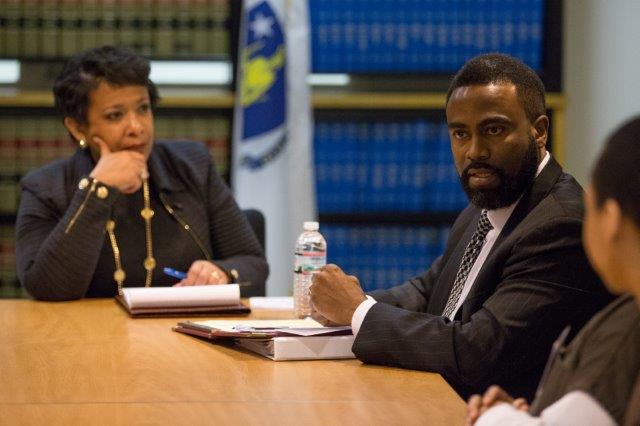Return on a Chance
Courtesy of Daryl Atkinson, Department of Justice Second Chance Fellow
Yesterday I had the privilege of accompanying Attorney General Loretta Lynch to Boston, MA to visit three outstanding reentry programs – the Common Ground Institute (CGI), the Boston Reentry Initiative (BRI), and Community Reentry for Women (C.R.E.W.). To say the trip was surreal would be an understatement because it occurred in the second week of my new role as the U.S. Department of Justice’s first Second Chance Fellow, and 16 years ago I was beginning my own reentry journey after being released from prison. President Obama recently said, “America is a nation of second chances.” For me, yesterday’s trip to Boston was the complete validation of that principle.

|
The facts are well known. Many people – too many people – face unnecessary obstacles to reentry. In order to successfully reenter society, they must navigate a maze of over 45,000 barriers to employment, housing, and civic participation, which may be triggered as a result of their contact with the criminal justice system. The long-term consequences of a criminal record hamper their ability to contribute to society, even after they have served their time and stand ready to serve their community.
As we flew back from Boston, I reflected on my reentry journey – particularly the key interventions that made a day like yesterday possible. In hindsight, the most critical component in my successful reentry was a viable support system, a loving family who provided food, clothing, shelter, and nurtured my dreams. Having those immediate physical and emotional needs met gave me the opportunity to pursue higher education and gainful employment. Yesterday, the Attorney General and I heard a similar message from a graduate of BRI who said his support system significantly aided his reentry and allowed him to be an integral part of the solutions to the problems in his community. This young man has remained crime free for 10 years, become gainfully employed at a major university, gotten married and had children, and even become a homeowner.
Of course, not all of the people with criminal records are blessed with a support system similar to mine and this BRI graduate. But society can facilitate successful reentry by continuing to create secondary support systems with evidence-based reentry programming and public policies that remove obstacles to reintegration, thereby giving formerly incarcerated people a real opportunity at a second chance. As a Second Chance Fellow, I look forward to working with new colleagues in DOJ’s Bureau of Justice Assistance on the Second Chance portfolio which supports programs like BRI.
The Obama Administration, through the Federal Interagency Reentry Council and with the advice and counsel of leaders in the formerly incarcerated community, has made great strides in creating secondary support systems for people with criminal records, particularly through the adoption of public policies that remove barriers and create opportunities to higher education, employment, and housing. For example, in July 2015, the Departments of Education and Justice announced the Second Chance Pell Pilot Program, which will allow incarcerated Americans to receive Pell Grants to pursue postsecondary education and training. In November 2015, President Obama banned the box for federal employment when he directed the Office of Personal Management to modify its rules to delay inquiries about criminal history until later in the hiring process. And the Department of Housing and Urban Development recently released guidance regarding the use of arrests in determining who can live in HUD-assisted properties. The adoption of these policies is an important step toward removing barriers, creating opportunities, and providing an environment for meaningful second chances for people with criminal records. In my new role, I look forward to working closely with the Reentry Council to further develop these policies.
Yesterday’s trip to Boston was an excellent harbinger of my role as a DOJ Second Chance Fellow. Attorney General Lynch and I met with various criminal justice stakeholders including formerly and currently incarcerated people to hear directly from them about what they need to be successful after incarceration. While at DOJ, I will continue to solicit and garner the perspectives of people and families directly impacted by incarceration to ensure that their perspectives are considered when developing reentry programs and policies.
I am hopeful that my work with DOJ will help make access to the American Dream attainable for more people with criminal records. As one of the participants in BRI said, “I want to start my own business, pay taxes, and make my parents proud.” It will be my job, along with my federal partners at DOJ, to help make his dreams a reality.

 U.S. Department
of Justice
U.S. Department
of Justice
